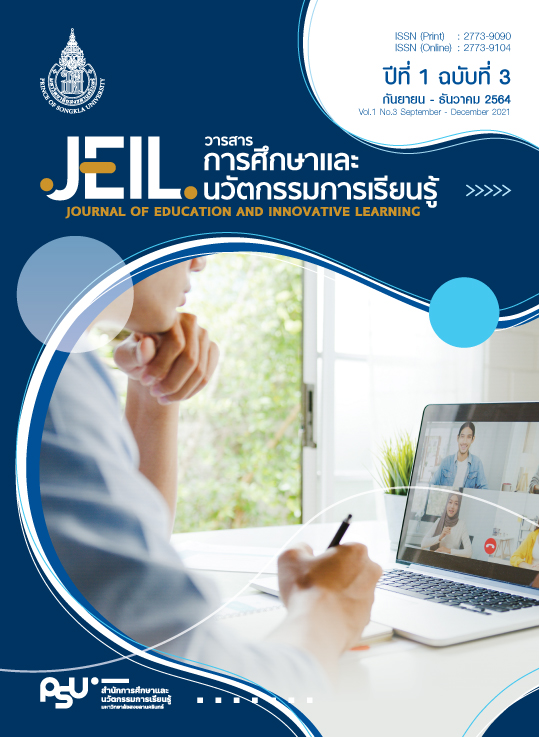การพัฒนาแพลตฟอร์มการจัดการเรียนรู้เชิงรุกโดยใช้แนวคิดคอนสตรัคติวิสต์เกี่ยวกับระบบไอซีทีและนวัตกรรมเพื่อการบริหารการศึกษาสำหรับนิสิตระดับบัณฑิตศึกษา
Main Article Content
บทคัดย่อ
การวิจัยและพัฒนานวัตกรรมทางการศึกษารวมถึงการออกแบบการจัดการเรียนรู้เชิงรุกโดยใช้กระบวนการสร้างสรรค์ทางปัญญาเป็นประเด็นสำคัญอย่างยิ่งในสถานการณ์ปัจจุบัน การวิจัยนี้มีวัตถุประสงค์เพื่อออกแบบและสร้าง ทดสอบ ทดลองใช้ และประเมินต้นแบบแพลตฟอร์มการจัดการเรียนรู้เชิงรุกโดยใช้แนวคิดคอนสตรัคติวิสต์เกี่ยวกับระบบไอซีทีและนวัตกรรมเพื่อการบริหารการศึกษา การวิจัยนี้เป็นการวิจัยและพัฒนา กลุ่มตัวอย่าง ได้แก่ นักศึกษาหลักสูตรศึกษาศาสตรมหาบัณฑิต มหาวิทยาลัยเทคโนโลยีราชมงคลรัตนโกสินทร์ ปีการศึกษา 2563 จำนวน 82 คน วิธีดำเนินการวิจัยมี 4 ขั้นตอน ได้แก่ 1) การศึกษาและวิเคราะห์ความต้องการของผู้ใช้ 2) การออกแบบและพัฒนาแพลตฟอร์ม 3) การทดสอบการใช้งานและประเมินผล และ 4) การปรับปรุงสมรรถนะของแพลตฟอร์ม
ผลการวิจัยพบว่า 1) แพลตฟอร์มการจัดการเรียนรู้เชิงรุกโดยใช้แนวคิดคอนสตรัคติวิสต์เกี่ยวกับระบบไอซีทีและนวัตกรรมเพื่อการบริหารการศึกษาใช้กระบวนการพัฒนาฐานข้อมูลแบบดีบีแอลซี ผู้เชี่ยวชาญเห็นว่าแพลตฟอร์มมีความเหมาะสมที่จะนำมาใช้ประกอบการเรียนการสอนได้จริง การทดลองใช้แพลตฟอร์มสำหรับการเรียนรู้ในระดับบัณฑิตศึกษาเป็นการเรียนรู้ควบคู่ไปกับเทคโนโลยีโดยมีการใช้งานที่ไม่ยุ่งยาก และนักศึกษามีความพึงพอใจในการใช้แพลตฟอร์มที่พัฒนาขึ้นอยู่ในระดับมาก 2) แพลตฟอร์มนี้มีโครงสร้างที่ประกอบด้วยเว็บไซต์ ฐานข้อมูลอาจารย์และนักศึกษา บันทึกความรู้ แบบประเมินความรู้ กระดานสนทนา คลังความรู้ ดาวน์โหลดเอกสาร และภาพกิจกรรมต่าง ๆ ดังนั้น แพลตฟอร์มที่ได้จะช่วยให้ผู้ศึกษามีทักษะเชิงปฏิบัติการในการเรียนรู้ด้านระบบไอซีทีและนวัตกรรมเพื่อการบริหารการศึกษาได้อย่างมีประสิทธิภาพ รวมถึงการพัฒนาทักษะด้านการใช้งานแพลตฟอร์มดิจิทัลเพื่อการศึกษาให้ดียิ่งขึ้น
Article Details

อนุญาตภายใต้เงื่อนไข Creative Commons Attribution-NonCommercial-NoDerivatives 4.0 International License.
เนื้อหาและข้อมูลในบทความที่ตีพิมพ์ในวารสารการศึกษาและนวัตกรรมการเรียนรู้ ถือเป็นข้อคิดเห็นและความรับผิดชอบของผู้เขียน ซึ่งกองบรรณาธิการวารสาร ไม่จำเป็นต้องเห็นด้วยหรือร่วมรับผิดชอบใด ๆ และไม่สงวนสิทธิ์การคัดลอกบทความเพื่อใช้ประโยชน์ทางวิชาการ แต่ให้อ้างอิงข้อมูลแสดงที่มาของบทความทุกครั้งที่นำไปใช้ประโยชน์
เอกสารอ้างอิง
Adnan, M., & Anwar, K. (2020). Online learning amid the covid-19 pandemic: students’ perspectives. Journal of Pedagogical Sociology and Psychology, 2(1), 45-51. doi:10.33902/JPSP.2020261309
Ancelin-Bourguignon, A. (2019). The priming role of qualitative research in constructivist management control teaching. Qualitative Research in Accounting & Management, 16(4), 463-490. doi:10.1108/QRAM-10-2017-0100Azorín, C. (2020). Beyond covid-19 supernova. Is another education coming?. Journal of Professional Capital and Community, 5(3/4), 381-390. doi:10.1108/JPCC-05-2020-0019
Bell, R., & Liu, P. (2019). Educator challenges in the development and delivery of constructivist active and experiential entrepreneurship classrooms in Chinese vocational higher education. Journal of Small Business and Enterprise Development, 26(2), 209-227. doi:10.1108/JSBED-01-2018-0025
Chandra, Y. (2021). Online education during covid-19: perception of academic stress and emotional intelligence coping strategies among college students. Asian Education and Development Studies, 10(2), 229-238. doi:10.1108/AEDS-05-2020-0097
Chapman, C., & Bell, I. (2020). Building back better education systems: equity and covid-19. Journal of Professional Capital and Community, 5(3/4), 227-236. doi:10.1108/JPCC-07-2020-0055
Dziubaniuk, O., & Nyholm, M. (2021). Constructivist approach in teaching sustainability and business ethics: a case study. International Journal of Sustainability in Higher Education, 22(1), 177-197. doi:10.1108/IJSHE-02-2020-0081
Hamdan, K. M., Al-Bashaireh, A. M., Zahran, Z., Al-Daghestani, A., AL-Habashneh, S., & Shaheen, A. M. (2021). University students’ interaction, internet self-efficacy, self-regulation and satisfaction with online education during pandemic crises of covid-19 (SARS-CoV-2). International Journal of Educational Management, 35(3), 713-725. doi:10.1108/IJEM-11-2020-0513
Krejcie, R. V., & Morgan, D. W. (1970). Determining sample size for research activities. Educational and Psychological Measurement, 30(3), 607-610.
Laudon, K. C., & Laudon, J. P. (2018). Management information systems: Managing the digital firm. (15th ed.). New York: Pearson Education Indochina.
Ministry of Higher Education, Science, Research and Innovation. (2019). Higher education act B.E. 2019. Bangkok: Shipping and Parcel Printing Houses. [in Thai]
Panjarattanakorn, D., & Phakamach, P. (2020, February). The development of a learning management system platform for educational administration theory and innovation. Paper presented at The 4th National Conference on Education 2020, Nakhonratchasima, Thailand. [in Thai]
Phakamach, P. (2010). ICT system and modern management. Bangkok: Witty. [in Thai]
Phakamach, P., KaewPlang, S., & Soeikrathoke, P. (2013). Development of an interactive electronic book for ICT system and modern management. Journal of Information Science, 31(1), 25-43. [in Thai]
Pisanu, F. (2014). Educational innovation and technology. Perspectives of Innovations, Economics & Business, 14(2), 103-108. doi:10.15208/pieb.2014.12
Porcaro, D. (2011). Applying constructivism in instructivist learning cultures. Multicultural Education & Technology Journal, 5(1), 39-54. doi:10.1108/17504971111121919
Raza, S. A., Qazi, W., Khan, K. A., & Salam, J. (2020). Social isolation and acceptance of the Learning Management System (LMS) in the time of covid-19 pandemic: an expansion of the UTAUT model. Journal of Educational Computing Research, 59(2), 183-208. doi:10.1177/0735633120960421


